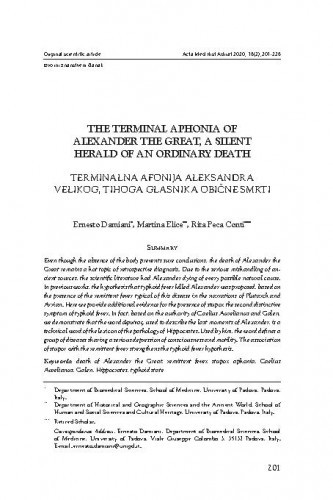Even though the absence of the body prevents sure conclusions, the death of Alexander the Great remains a hot topic of retrospective diagnosis. Due to the serious mishandling of ancient sources, the scientific literature had Alexander dying of every possible natural cause. In previous works, the hypothesis that typhoid fever killed Alexander was proposed, based on the presence of the remittent fever typical of this disease in the narrations of Plutarch and Arrian. Here we provide additional evidence for the presence of stupor, the second distinctive symptom of typhoid fever. In fact, based on the authority of Caelius Aurelianus and Galen, we demonstrate that the word ἄφωνος, used to describe the last moments of Alexander, is a technical word of the lexicon of the pathology of Hippocrates. Used by him, the word defines a group of diseases sharing a serious depression of consciousness and motility. The association of stupor with the remittent fever strengthens the typhoid fever hypothesis.; Iako odsutnost tijela sprječava sigurne zaključke, smrt Aleksandra Velikog ostaje atraktivna tema retrospektivne dijagnoze. Zbog kriva tumačenja drevnih izvora, u znanstvenoj su literaturi Aleksandrovoj smrti pripisivani svi mogući prirodni uzroci. U prethodnim je radovima, na temelju prisutnosti remitentne groznice tipične za ovu bolest u pripovijedanjima Plutarha i Arriana, predložena pretpostavka da je Aleksandra ubila tifusna groznica. U ovom radu donosimo dodatne dokaze o prisustnosti stupora, drugoga karakterističnog simptoma tifusne groznice. Zapravo, na temelju autoriteta Celija Aurelijana i Galena, pokazujemo da je riječ ἄφωνος, koja se upotrebljava za opisivanje posljednih Aleksandrovih trenutaka, tehnička riječ iz leksikona Hipokratove patologije. Ta riječ, kojom se on služi, definira skupinu bolesti koje dijele ozbiljnu depresiju svijesti i motorike. Povezanost simptoma stupora s remitentnom groznicom jača pretpostavku o tifusnoj groznici.
Sažetak

 Acta medico-historica Adriatica : 18,2(2020) / glavni urednik, editor-in-chief Igor Eterović.
Acta medico-historica Adriatica : 18,2(2020) / glavni urednik, editor-in-chief Igor Eterović.